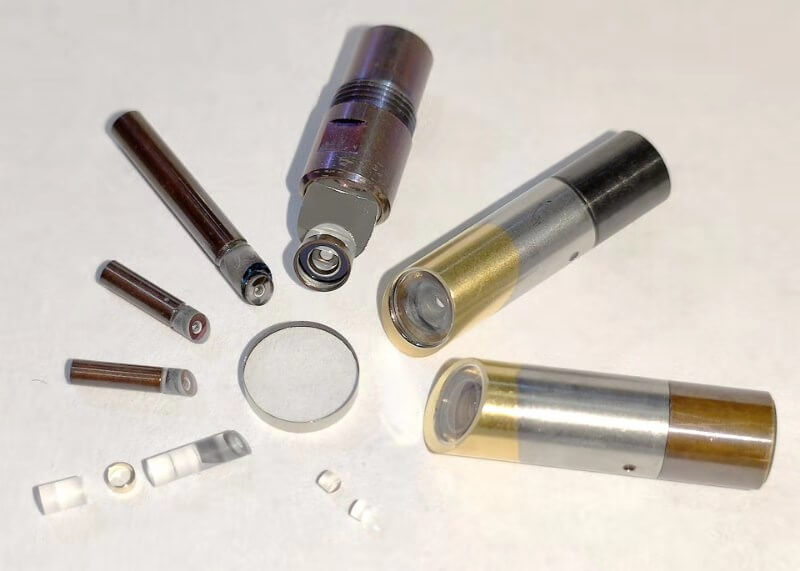工業(yè)內(nèi)窺鏡與醫(yī)用內(nèi)窺鏡,從名稱上看都是內(nèi)窺鏡,其中醫(yī)用內(nèi)窺鏡出現(xiàn)的比較早,工業(yè)內(nèi)窺鏡是在醫(yī)用內(nèi)窺鏡的基礎(chǔ)上生產(chǎn)出來的,兩者的基本原理是一樣的,按照發(fā)展及成像構(gòu)造分類,也都可以分為:硬管式內(nèi)窺鏡、纖維內(nèi)窺鏡、電子內(nèi)窺鏡等。那么工業(yè)內(nèi)窺鏡和醫(yī)用內(nèi)窺鏡的不同之處體現(xiàn)在哪里呢?
Both industrial endoscopes and medical endoscopes are endoscopes in terms of name. Medical endoscopes appeared earlier. Industrial endoscopes are produced on the basis of medical endoscopes. The basic principles of the two are the same. According to the development and imaging structure, they can also be divided into: hard tube endoscopes, fiber endoscopes, electronic endoscopes, etc. So what is the difference between industrial endoscope and medical endoscope?
首先,從名稱上看,兩者的用途是不同的。
First of all, from the name point of view, the two purposes are different.
工業(yè)內(nèi)窺鏡是工業(yè)用途的無損檢測設(shè)備,能對彎曲管道深處以及人眼不能直視的部位進(jìn)行觀測,能實現(xiàn)遠(yuǎn)距離觀察與操作。采用工業(yè)內(nèi)窺鏡,無需拆卸或損壞,就可以方便而且迅速地檢查各種機(jī)器、設(shè)備、組裝物體的內(nèi)部,在石油化工、汽車零部件制造、航空航天、警用安保、軌道交通等行業(yè),都有著廣泛的用途。
Industrial endoscope is a non-destructive testing equipment for industrial use. It can observe the depth of curved pipeline and the parts that can not be looked directly by human eyes, and can realize long-distance observation and operation. The industrial endoscope can easily and quickly inspect the interior of various machines, equipment and assembled objects without disassembly or damage. It is widely used in petrochemical, auto parts manufacturing, aerospace, police security, rail transit and other industries.

醫(yī)用內(nèi)窺鏡是一種常用的醫(yī)療器械,主要用于對人體的常規(guī)醫(yī)療檢查和外科手術(shù)中,使用時,將內(nèi)窺鏡經(jīng)人體的天然孔道,或者是經(jīng)手術(shù)做的小切口導(dǎo)入待檢查的器官,可直接窺視有關(guān)部位的變化,配合使用其他手術(shù)器械就可以在體外進(jìn)行體內(nèi)的密閉手術(shù)操作。具有操作靈活簡便、減少病患痛苦、提高效率等優(yōu)點,醫(yī)用內(nèi)窺鏡的功能性微創(chuàng)手術(shù)技術(shù)已近得到醫(yī)生和患者的廣泛接受。
Medical endoscope is a commonly used medical instrument, which is mainly used in the routine medical examination and surgical operation of the human body. When in use, the endoscope is introduced into the organ to be examined through the natural pore of the human body or the small incision made by the operation, which can directly spy on the changes of relevant parts. Combined with other surgical instruments, the closed surgical operation in the body can be carried out in vitro. It has the advantages of flexible and simple operation, reducing patient pain and improving efficiency. The functional minimally invasive surgery technology of medical endoscope has been widely accepted by doctors and patients.
其次,因為用途不同,兩者對材料、成像等方面的要求也不同。因為醫(yī)用內(nèi)窺鏡伸到人體內(nèi)與人體會接觸產(chǎn)生摩擦,為了避免產(chǎn)生不適感以及不必要的損傷,所以通常選用比較柔軟的材料。而工業(yè)內(nèi)窺鏡一般是伸到工業(yè)設(shè)施內(nèi)部,經(jīng)常與金屬等堅硬材質(zhì)摩擦,所以通常選用耐磨性較好的材料(如鎢鋼絲)做外層。此外,兩者的成像雖然都是清晰的,但是前者的用途是觀察人體內(nèi)部器官,因此更關(guān)注圖像的色彩和柔和度;而工業(yè)內(nèi)窺鏡的觀察對象是相對狹小空間內(nèi)的金屬,因此需要考慮金屬反光、照明強(qiáng)度等問題,以確保成像的清晰。
Secondly, because of different uses, they have different requirements for materials and imaging. Because the medical endoscope extends into the human body and will contact with the human body to produce friction, in order to avoid discomfort and unnecessary damage, relatively soft materials are usually selected. Industrial endoscopes generally extend into industrial facilities and often rub with hard materials such as metal, so materials with good wear resistance (such as tungsten steel wire) are usually used as the outer layer. In addition, although both images are clear, the former is used to observe the internal organs of the human body, so it pays more attention to the color and softness of the image; The observation object of industrial endoscope is the metal in a relatively narrow space, so it is necessary to consider the problems such as metal reflection and lighting intensity to ensure the clarity of imaging.
以上對工業(yè)內(nèi)窺鏡和醫(yī)用內(nèi)窺鏡的不同之處進(jìn)行了簡要的介紹。目前,有的內(nèi)窺鏡廠家兩種產(chǎn)品都有,有的廠家則是從醫(yī)用內(nèi)窺鏡起家,后轉(zhuǎn)向工業(yè)內(nèi)窺鏡。
The differences between industrial endoscope and medical endoscope are briefly introduced. At present, some endoscope manufacturers have both products, while others start from medical endoscopes and then turn to industrial endoscopes.



 公司:匠仁醫(yī)療設(shè)備有限公司
公司:匠仁醫(yī)療設(shè)備有限公司